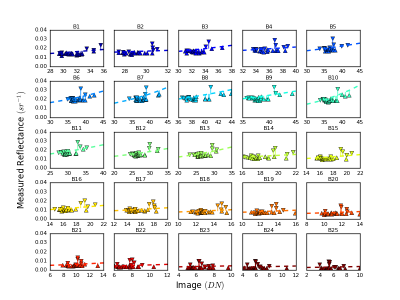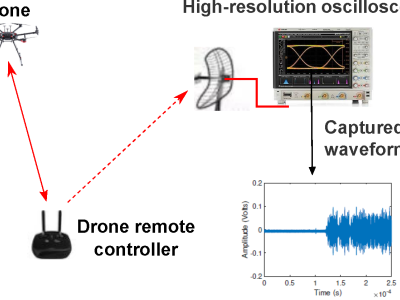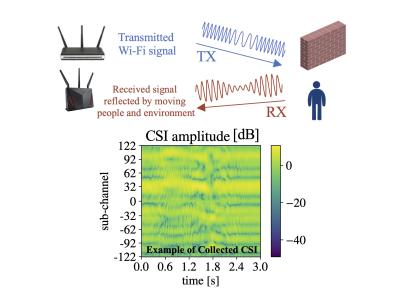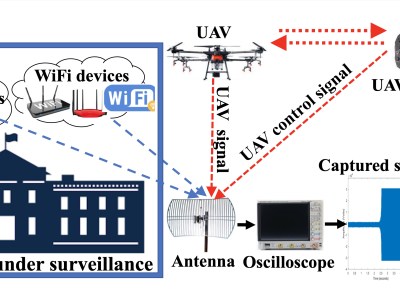Processed airborne hyperspectral images and mosaics of a Paranapanema River region in Capivara reservoir, Brazil
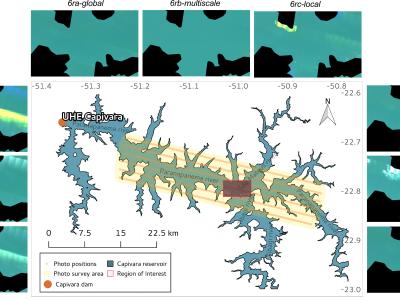
- Citation Author(s):
-
Marcus Moraes (UNESP)
- Submitted by:
- Alisson Fernando Carmo
- Last updated:
- DOI:
- 10.21227/dxgz-3m95
- Data Format:
- Links:
 793 views
793 views
- Categories:
- Keywords:
Abstract
This database is a image set of a strongest glint-affected region of inland water Capivara reservoir, Brazil. We carried out a flight survey in September 2016 on the confluence region of the Tibagi and Paranapanema Rivers. We use the hyperspectral camera manufactured by Rikola, model FPI2014, wich collect 25 spectral bands at following intervals and full widths at half maximum (FWHM), both expressed in nanometers (nm):
505.37, (9.51), 515.31 (14.05), 528.55 (14.82), 539.87 (14.03), 546.99 (14.31), 554.99 (13.26), 560.22 (12.11), 570.44 (14.31), 579.58 (13.26), 592.57 (16.57), 605.73 (14.98), 620.22 (16.26), 625.92 (15.47), 655.06 (12.55), 665.72 (15.59), 670.03 (15.74), 681.33 (15.89), 695.04 (14.96), 700.46 (15.44), 707.96 (15.32), 715.19 (15.37), 725.37 (14.72), 737.29 (14.98), 749.87 (15.08) and 780.1 (14.72).
The external orientation parameters (EOP) are acquired by dual frequency GPS and adjusted with tie points computed by bundle adjustment. We perform individual georeferencing on each individual image.
This dataset was processed using nine approaches to mosaicking individual georeferenced images. Three of then are new proposed methods developed by the authors. Details of processing and methodology are described on the oficial paper (currently in review process of journal).
The authors thank the Graduate Program in Cartographic Sciences (PPGCC) of the School of Science and Technology (UNESP), campus Presidente Prudente, for allowing the development of this research; the National Council for Scientific and Technological Development (CNPq) and the Coordination for the Improvement of Higher Education Personnel (CAPES) for financial assistance dedicated to the project. The authors extend special thanks to the São Paulo Research Foundation (FAPESP) for financial support for the hyperspectral camera (2013/50426-4).
Instructions:
Each folder have specific resources generated on the processing steps. The generated resources, step by step, are:
1-roi_target.zip: ROI and river target shapefiles to delimit the process;
2-roitarget.zip: intersection of the ROI and river target;
3-imgs_roi.zip: Images clipped by the ROI target;
4-virtual_bands_None.zip: Virtual bandset generated using GDAL;
5ra-pixel_refs.zip: CSV file of mode values of each image band;
5rb-img_ref_fast_None.zip: Multscale image references generated by the author method proposes;
5rc-img_ref_gaussianmedian_None.zip: Local image references generated with Gaussian filter;
6ra-mosaics_refmodaNone.zip: Global reference mosaic;
6rb-mosaics_refDQNone.zip: Multiscale reference mosaic;
6rc-mosaics_ref_gaussianNone.zip: Local reference mosaic;
6sa-mosaic_first_None.zip: First value mosaic
6sb-mosaic_last_None.zip: Last value mosaic;
6sc-mosaic_mean_None.zip: Mean value mosaic;
6sd-mosaic_median_None.zip: Median value mosaic;
6se-mosaic_maximum_None.zip: Maximum value mosaic;
6sf-mosaic_minimum_None.zip: Minimum value mosaic;
Details and descriptions about the full process steps are in the oficial paper (under journal review).
Dataset Files
- 1-roi_target.zip (Size: 27.37 KB)
- 2-roitarget.zip (Size: 3.52 KB)
- 3-imgs_roi.zip (Size: 1.52 GB)
- 4-virtual_bands_None.zip (Size: 90.92 KB)
- 5ra-pixel_refs.zip (Size: 14.83 KB)
- 5rb-img_ref_fast_None.zip (Size: 4.34 MB)
- 5rc-img_ref_gaussianmedian_None.zip (Size: 224.25 MB)
- 6ra-mosaics_refmodaNone.zip (Size: 326.47 MB)
- 6rb-mosaics_refDQNone.zip (Size: 320.57 MB)
- 6rc-mosaics_ref_gaussianNone.zip (Size: 329.79 MB)
- 6sa-mosaic_first_None.zip (Size: 342.71 MB)
- 6sb-mosaic_last_None.zip (Size: 335.87 MB)
- 6sc-mosaic_mean_None.zip (Size: 335.94 MB)
- 6sd-mosaic_median_None.zip (Size: 330.05 MB)
- 6se-mosaic_maximum_None.zip (Size: 379.53 MB)
- 6sf-mosaic_minimum_None.zip (Size: 328.02 MB)


